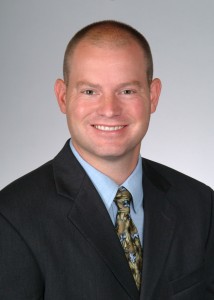by Dr. Ian Jenkins MD
I recently had the opportunity to serve as a mentor for Project Protect, an initiative of the Health Research & Education Trust (HRET) that paired rising stars in quality and infection prevention with mentors from several organizations, including the Society of Hospital Medicine (SHM). Mentees worked on Catheter Associated Urinary Tract Infection (CAUTI) prevention in ward, emergency room, and intensive care settings with their mentors, and received web-based training from IHI supplemented by a series of group phone calls. The project culminated in a meeting in March of this year when the fellows shared their work and my mentee, Dr. Greg Hall, won second place overall for his efforts to reduce unnecessary urinary catheter insertion in the MUSC emergency room.
How did you find out about Project Protect?
The Chief Risk Officer and Hospitalist at our hospital, Dr. Danielle Scheurer, is one of my mentors. We had started submitting data to the On the Cusp CAUTI project for the South Carolina Hospital Association and she contacted me to see if I would be interested in Project Protect. I looked over the information on the website and thought it would be a great opportunity, applied, and the rest is history.
Once you heard about the Project Protect, why did you want to participate? Which aspects of the program were most appealing to you? What did you hope to gain from the program?
At the time I heard about the Project, we were starting to pull together some groups and resources to attack our CAUTI rates at MUSC- preliminary efforts were not showing a great deal of improvement. The initial pull to the project was the opportunity to learn from other institutions and experts and put together a much more robust plan for our ED. The secondary gain, though, was the opportunity to increase my knowledge and skills in improvement projects that would expand to not only CAUTI but multiple other quality issues we face daily in the ED and hospital. I hoped that the IHI courses, national content experts, leadership experts, mentors, and other fellows would be great resources to make a difference now and even more so with future projects.
What was the most rewarding thing about participating in Project Protect?
The people, mentors and mentees! Anytime one of the fellows had a question or problem- we all realized how universal the issues we faced were and working together we learned how other places addressed those issues. The amount of expertise in the fellowship was outstanding and the networking and multidisciplinary representation helped enlighten me to so many new ways to approach our problems and learn from each other. Many times, the issues we faced had been solved by someone else and this saved a great deal of time in fixing our individual problems- especially when it revolved about EMR (Epic issues).
What future work are you doing or planning on doing in quality improvement? How did your experience with Project Protect assist with your current/future endeavors?
Currently we are working on multiple quality projects at MUSC and in the ED. We are working on improved length of stay, pain management, decreasing errors, teamwork training, sepsis care, and of course will continue to work on reducing indwelling urinary catheters. The resources and structure that were built into the fellowship with Project Protect has been and will be enormously helpful with framing the appropriate problem, establishing the critical team to address the problem, setting up reasonable short and long term goals, overcoming obstacles, and spreading the improvements throughout the institution.
What would you change about the Project Protect program?
Although the monthly peer calls were very helpful, the in-person events were amazing. The interaction, discussion, and problem solving was so much more detailed and concentrated when we met together. Unfortunately it would be nearly impossible to meet every month, but having a few more in-person conferences would have been wonderful.
Would you ever consider serving as a mentor for Project Protect if given the opportunity? The mentoring was absolutely one of the most rewarding aspects of the project. I would be honored to work with groups like this in the future and would definitely consider being a mentor for a fellowship like this in the future.
It was a great pleasure working with Dr. Hall and the Project Protect team at HRET, but three things really stand out for me: watching Greg’s successful project unfold, seeing him get recognized with an award for second best overall project, and hearing that his role as a quality champion at MUSC is expanding beyond this project and beyond the ER. Now, if we could just get him protected time or money for all that work! I always jump at a chance to serve as a mentor which is always interesting, rewarding, and educational for me, although it’s sometimes challenging (not this time!).
 Dr. Ian Jenkins MD (Mentor) is a Professor of Medicine at UCSD Health System, where he has worked as a hospitalist since completing his residency at the Beth Israel Deaconess Medical Center of Harvard University. In addition to clinical care, he has participated in quality improvement projects covering VTE prevention, anticoagulation safety, communication, medical education, contrast safety, PPI use, and alcohol withdrawal, and has served as a quality mentor for several hospital systems and national collaboratives addressing VTE prevention and hospital infection control through the Society of Hospital Medicine and “On the CUSP: Stop HAI.” He has given over 40 presentations on these topics, medical costs, and sepsis, and co-directs UCSD’s pre-internship medical school class.
Dr. Ian Jenkins MD (Mentor) is a Professor of Medicine at UCSD Health System, where he has worked as a hospitalist since completing his residency at the Beth Israel Deaconess Medical Center of Harvard University. In addition to clinical care, he has participated in quality improvement projects covering VTE prevention, anticoagulation safety, communication, medical education, contrast safety, PPI use, and alcohol withdrawal, and has served as a quality mentor for several hospital systems and national collaboratives addressing VTE prevention and hospital infection control through the Society of Hospital Medicine and “On the CUSP: Stop HAI.” He has given over 40 presentations on these topics, medical costs, and sepsis, and co-directs UCSD’s pre-internship medical school class.
 Dr. Gregory Hall MD (Fellow/Mentee) is an emergency physician and fellow of the American College of Emergency Physicians. He went to medical school at the University of Cincinnati graduating in 2000 and did his residency in emergency medicine at University Hospital, Cincinnati, Ohio finishing in 2004. He has been board certified in emergency medicine since 2005. Currently Greg is an assistant professor of Medicine and is faculty in the Division of Emergency Medicine and Pediatric Emergency Medicine at the Medical University of South Carolina. Greg is also the Director of Quality and Patient Safety for the division. He works with the quality team to improve not only the clinical care but also the safety of that care for their patients.
Dr. Gregory Hall MD (Fellow/Mentee) is an emergency physician and fellow of the American College of Emergency Physicians. He went to medical school at the University of Cincinnati graduating in 2000 and did his residency in emergency medicine at University Hospital, Cincinnati, Ohio finishing in 2004. He has been board certified in emergency medicine since 2005. Currently Greg is an assistant professor of Medicine and is faculty in the Division of Emergency Medicine and Pediatric Emergency Medicine at the Medical University of South Carolina. Greg is also the Director of Quality and Patient Safety for the division. He works with the quality team to improve not only the clinical care but also the safety of that care for their patients.
###
What is Project Protect?
Catheter-associated urinary tract infections (CAUTI) are the most common type of health care-associated infections. As many as one-fourth of all hospital inpatients may have a short-term, indwelling urinary catheter placed during their hospital stay. A significant portion of these catheters are placed without appropriate indications. Complications associated with CAUTI result in increased length of stay, patient discomfort, excess health care costs, and sometimes mortality. An estimated 13,000 deaths are associated with CAUTI each year. However, most cases of CAUTI are preventable.
On the CUSP: Stop CAUTI aims to reduce mean rates of CAUTI in U.S. hospitals. The initiative is working with state organizations and hospitals across the country to implement the Comprehensive Unit-based Safety Program (CUSP) and CAUTI reduction practices in hospital units.
On the CUSP: Stop CAUTI presents Project Protect: Infection Prevention Fellowship, providing enriched training, leadership development and expert mentorship to foster the growth of dedicated leaders and infection prevention champions committed to improving safety and reducing CAUTIs.
This twelve month fellowship combines in-person and virtual educational sessions with one-on-one mentoring by national experts from four partner organizations. The fellowship experience will culminate in a capstone project focused on a hospital-acquired infection challenge that is directly or indirectly related to catheter associated urinary tract infection (CAUTI) prevention at the fellow’s own organization.
This twelve month fellowship combines three foundational elements:
- Educational Opportunities—In-person and virtual educational sessions on foundational quality improvement and patient safety topics led by national experts.
- Mentoring—Fellows will have one-on-one mentoring from one of four partner organizations: Society for Healthcare Epidemiology of America (SHEA), Association for Professionals in Infection Control and Epidemiology (APIC), Society of Hospital Medicine (SHM) and Emergency Nurses Association (ENA).
- Capstone Improvement Project—The fellowship experience will culminate in a capstone project focused on a hospital-acquired infection challenge that is directly or indirectly related to catheter associated urinary tract infection (CAUTI) prevention at the fellow’s own organization.



Leave A Comment